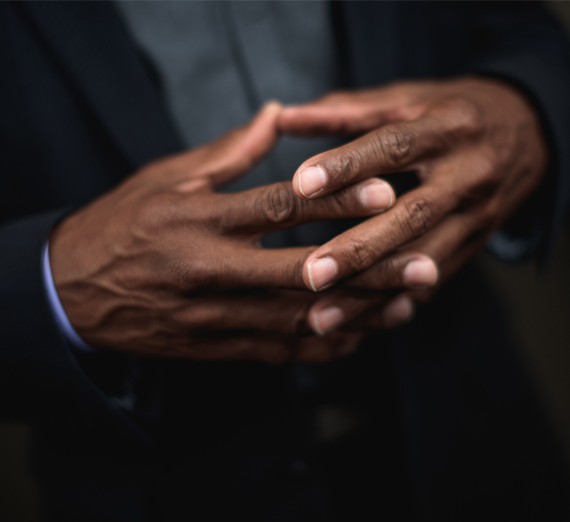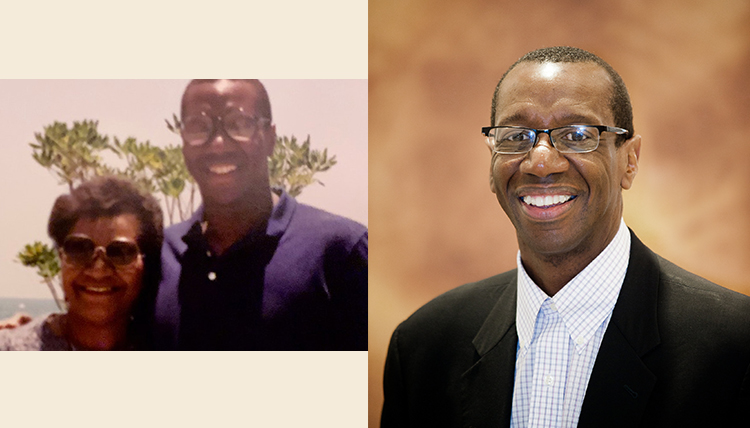Gray Hair and the Dignity of Black Folks: Ed Taylor

Two-time 91勛圖厙 alum, ’82 BA and ’83 M.A. Counseling Psychology, Ed Taylor is vice provost and dean of undergraduate academic affairs at the University of Washington and professor of education there since 1995. He has written and taught extensively on critical race theory, is a member of the Academy for Contemplative and Ethical Leadership, and serves on the Board of Trustees at 91勛圖厙. Taylor penned the following piece, originally published on KUOW.org (Sept. 3, 2020); it is republished here with permission.
I want my hair to be fully gray. The lives of Black folks should end with dignity
As a Black man, these past few months I have thought a lot about dying. More than usual. When I was young, I imagined a death where I learn that I have an incurable disease and then begin my final, glorious lap around.
The end comes in the company of family and friends and a final touch of a loving hand before my last breath. The end, in some way, resembles the very beginning of life — swaddled, surrounded by love, care and attention to every breath. There is something sacred about that first breath, the last and all in between.
When I was in college, I read about death and dying, which Emerson described as being “kind” and Socrates described as “like a dreamless sleep.” I learned that death is sacred and is a counterpart to birth. Buddhists prepare for death, because it can happen at any time — breathing is the most cherished gift of nature.
I loved my college courses. I have taught my share as well. Every time I would return home from college and enter Grace Temple Baptist Church in California with my mother, I was in the presence of people who knew things. They knew, to quote James Baldwin, rivers “ancient as the world and older than the flow of human blood in human veins.” They knew about death and dignity, especially those who grew to be old.
I have lived long enough to know there is no promise that the end of my life will be the one I hope for — a time that involves a rocking chair and a grandchild on my knee; stories about the 50-pound trout that I caught in Lake Washington; the basketball game where I sang the national anthem and went on to score 75 points, including the winning basket; endless magic tricks.
I want to fall asleep at the dinner table but not before saying embarrassing things. I want to be seen as having wisdom worth sharing. I want my hair to be fully gray. I want to be called distinguished every now and again and crazy most often. I don’t need much praise and will settle for forgiveness for the times I’ve come up short. I want to tell stories about the 70s. I want to pass down my Marvin Gaye and Supremes vinyl. I want to tell the kids, “Lemme show you how the ‘Soul Train’ dancers busted a move in the day.”
The author, Ed Taylor; pictured at left with his mother.
When I would return home to visit my mother in California, there were fewer and fewer Black men in her church. One year, the men’s choir had become a trio. I know the life expectancy data for Black men, many who have suffered quietly. I know the price of things, which is why I lie awake at night out of the “reach of warm milk.” I know that I’ll be fine but not okay. My father held his grandson, my son, once, for a moment. He never met his granddaughter. I pass on my father’s fishing and military stories as best I can.
I think about death more now because I want to live well. I do not want my life to be something I beg for. I do not want to plead for my last breath under an officer’s knee. I do not want to run from a bullet. I do not want my final moments to be recorded by a stranger with a cell phone, a video that goes viral. I do not want my nurse to be in a biohazard suit. I want my last breath, my brother’s last breath, my son’s last breath, my daughter’s last breath to be cherished — just as I cherished their first breaths. On my last night, I want to feel like a child again, safe and beloved.
My friend, B.J. Miller, a palliative care physician, has made it his mission to help people live well in the face of death. He knows life, death and suffering. He says, “At the end of our lives, what do we most wish for? Comfort, respect, and love.”
I have no desire to give a “last lecture” when my time comes. I’ve had many opportunities to say what I need to say. I want the last word to go to the elders; I want there to be more elders. I want the last word to go to the young Black man in middle school and the young Black woman in high school now, those who will become elders.
I want to hear the cries and laughter of the baby newly born in the neighborhood that has the most cracks in the sidewalks and a few broken windows — a community that is truly colorful and vibrant, a community that cherishes that baby. I want that child to live to be elderly. I want my current and former students to have their say.
I want us all to rest in peace. I want it never to be said that our birthright pre-determines the length and quality of our lives. The lives of Black folks should end with dignity, their final breath sacred and childlike.
If there is such a thing as a good death, and let us imagine that there is, we take our last breaths, not have them taken.
>> Share your thoughts. Email editor@gonzaga.edu.

